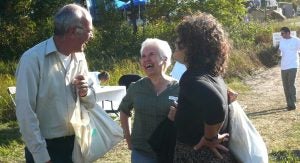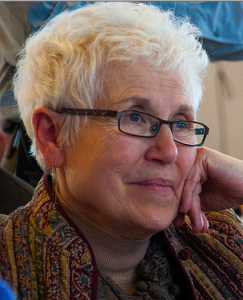Harriet Friedmann | SFSI Visting Faculty
A pioneer of sustainable food systems scholarship, Harriet Friedmann has been researching, teaching, and writing about food systems since the 1970s. She was an early member of the Toronto Food Policy Council and has taught for over 40 years in the fields of Sociology, Geography, Planning, and International Relations at the University of Toronto. While her work is wide ranging and interdisciplinary, she is perhaps most well known for co-founding the food regime approach, which explores periods of stability and transition in power and accumulation centered on agriculture and food. Dr. Friedmann currently studies the Global Political Ecology of Food, with her recent publications focusing on implications for emergent food system governance of long histories of food system transformation across social/natural scales.
In what ways does your work relate to sustainable food systems?

I started off long before there was such an idea as “food systems,” wanting to understand world markets empirically and historically. I chose the world wheat market as a case study, since it was intrinsically interesting to me. However, no one else thought so until I was recruited by colleagues in Rural Sociology to contribute to conferences and journals because of the threads of family farming and sociology of agriculture. These converged with the work of Philip McMichael. Together we created the historical food regime perspective. Over the years, my experience changed from questions of “You study food?! Why is that important?” to eventually becoming something like an elder of food studies. At the beginning, I was stubborn, I knew intuitively that food was important to the political economy, and I just stuck to my guns. I had an unusual career at the University of Toronto for over 40 years, moving between departments as the wave of interdisciplinary food studies came up against budgetary limits. hey recruited me to teach in International Relations, Geography, and Planning, while I remained based in Sociology, allowing me to learn from my interdisciplinary colleagues and students.
I also was a part of the Toronto Food Policy Council from its early days in the 1990s where it began as citizen participation with the support of public officials in the municipal health department. We had to define something that never existed – there was agricultural policy and health policy, but what was food policy? So the first job of the Food Policy Council was to write a series of position papers about hunger, employment, student nutrition, retail, community gardens, and other aspects of food policy, all (except the one showing diet is related to diabetes and chronic heart disease!) adopted by the Board of Health. We advocated for food policies at higher levels of government and formed the foundation for food to become institutionalized into our city government.
What does your grandiose vision for a more equitable, healthy, and sustainable food system look like?

It would mean living with the land in all ways. The food system would be a part of any land use project, for instance, green roofs could be edible roofs as well as serving other environmental goals. Every piece of what you do would include food from the design through the evolving relations among people. All the elements of land use, of community, of culture, and of economy – food would be at the center. People would have opportunities to grow, at least a little bit, and to cook, at least a little bit. All the disciplines that feed into growing and cooking, such as botany, soil science, biochemistry, nutrition, psychology and sociology, would integrate formal sciences with more site-specific knowledge. A social economy would weave together the material and social elements of people’s lives through how we get food from our habitat and how we prepare and share it for healthy bodies, cultures, and social relations.
What is your strongest food memory?
I grew up in Louisiana, in an immigrant family surrounded by cajun cuisine. My first experience of encountering another culture through food, and really all stages of food, was a weekend spent at a friend’s grandmother’s house when I was 7 or 8 years old. We ran around the village and saw people pulling in shrimp with nets off the dock and another person making sausage in a hand run machine – I learned that the casing for the sausage was the intestine – and things like that. When we sat for dinner with her extended family around a very long picnic table, I was hungry. They started passing around meat in some red sauce, and I started eating it. Then her teenage brother, who had been hunting in the afternoon, called from the other end of the table to ask me, “Do you know what you’re eating?”
I said, unsure, “Chicken?”
And he said, “Squirrel!”
I kept eating it, because I had already decided it was good. I haven’t eaten any since that time, but I do notice there are big fat squirrels in Ann Arbor.
Have any particular authors, articles or documentaries had a significant impact on you? Which one(s)?
Since beginning my studies of political ecology, I am greatly influenced by William Cronon’s books, Nature’s Metropolis: Chicago and the Great West, and Changes in the Land: Indians, Colonists, and the Ecology of the Land. I am also influenced by founding work on intellectual property and seeds by Jack Kloppenburg, and ideas of “new peasants” by Jan Douwe van der Ploeg. I am very interested in work by Lovelock and Margulis on the idea of Gaia. I am exploring panarchy models from the Stockholm Resilience Centre and the journal Ecology and Society. On cities, Carolyn Steel’s Hungry City. Too much too say!

Do you have any advice for students interested in food-related careers?
Try to see what is needed in the food system, and just find a way to do it. Connect with work that is already happening, and find work that is needed and isn’t yet happening. Then have the courage to do it and don’t worry about failure along the way. It’s way more fun that way, and in the emerging world, it will be possible to make a living, perhaps a modest one. It’s all about learning, and just getting to the next thing. Try to learn lessons, but don’t get too attached to that either. We have to let go of needing to know. You gain experience in a less linear way, but rather a multidimensional way. Yet each little bit makes progress to the greater common goal of a sustainable and just food system.



